Whether you’re still dreaming of your own RV or you’ve been on the road for years, it’s always good to get more boondocking tips.
How do you ensure you have enough power? What do you do with your waste?
The advice we’ve gathered can help you learn new ways to boondock or remind you of things you’ve forgotten.
Let’s get started!
What Is Boondocking?
Boondocking is off-grid camping in secluded areas without amenities. Meaning you won’t have electricity, water, or sewer connection. You probably won’t have access to a dump station either.
Unlike camping in a campground and RV Park, there are usually no fees. Most boondocking takes place in national forests and BLM Land (Bureau of Land Management).
Some people also call it wild camping or dry camping. Regardless, it means being self-sufficient and prepared for emergencies.
#1 Leave No Trace
Boondocking locations don’t have trash bins or dumpsters, but this is not an invitation to strew your trash all over your campsite. It means you need space in your RV or tow vehicle to store your garbage.
Pack enough garbage bags for your regular trash and any you might find in and around your campsite. Walk around the site and confirm you’ve not left anything behind when you leave.
Your camp and surrounding areas should be left in better condition than you found them.
#2 Know Your Power Needs
Plan your trip around the weather. You don’t want to camp in the middle of a hot summer. Running your AC takes too much power. If the weather is too cold, you’ll end up using too much propane.
What electronics will you be running while camping? Do you use an electric cooker or coffee maker? Or will you use only your propane stove? Do you have cooking gear that doesn’t need electricity? You’ll need to know this ahead of time to plan appropriately.
Keep in mind: Here are 7 reasons you don’t need RV solar power.
#3 Use Less Electricity
Remember, you won’t have electric hookups while boondocking, so this tip covers quite a bit.
Make sure your refrigerator is running on propane. Many will flip to propane automatically but double-check it once you park.
To keep the sunshine from heating the inside of your RV, use reflective and insulated shields over your windows. Try to park in a way where your largest windows are facing north and south.
If it’s chilly, dress warmly and use those blankets. If that’s still not enough, consider using a low-watt 12-volt blanket to keep you warm without cranking up your furnace.
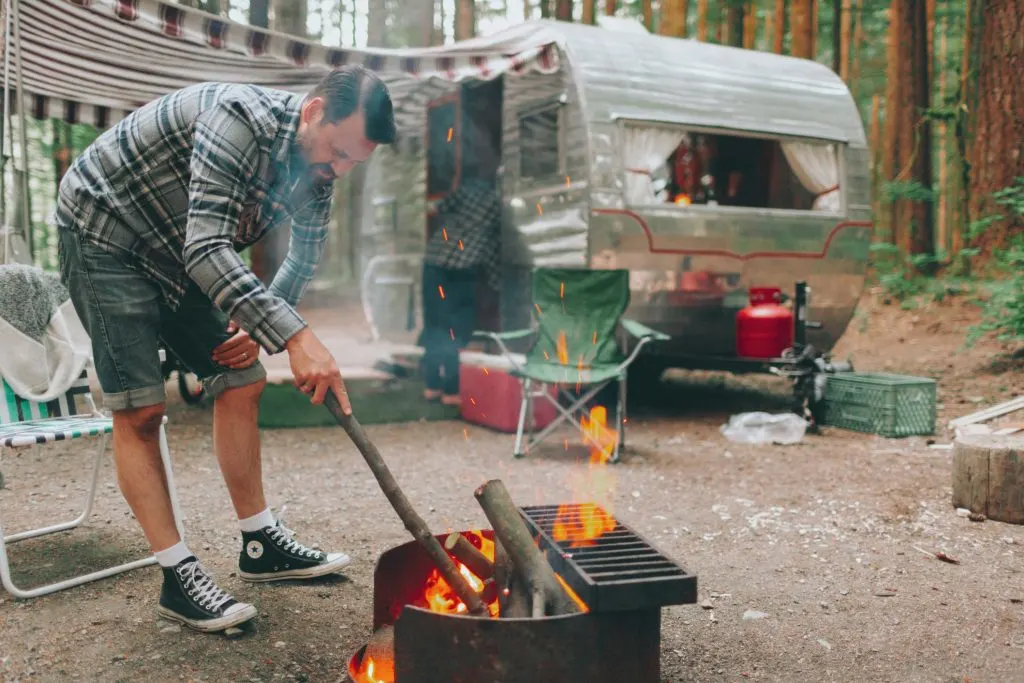
#4 Have Backup Power
While dry camping, you can use a gas generator, portable solar generator, roof-mounted solar panels, or a combination of all three. If you’re using a fuel generator, make sure you have extra fuel to keep from running out.
Solar generators are high-capacity batteries that store energy collected from portable solar panels. The battery has outlets, USB, and 12-volt ports to charge and power devices.
Roof-mounted solar panels allow you to store energy in battery banks and then use your RV, built-in appliances, and lights as if plugged in at a campground. You still need to limit the amount of electricity you use because most solar setups cannot run your AC, microwave, fridge, TV, etc.
We also recommend having other solar-powered items such as lights, radios, backpacks, ovens, showers, and speakers. These help minimize the draw on your batteries.
#5 Bring Plenty of Water
All our boondocking tips are essential, but you won’t make it very far without having enough fresh drinking water.
Prepare for your boondocking trip with a clean and full freshwater tank. Even if you don’t think you’ll use all of that water, make sure to have it.
Consider having clean and full portable water containers to be even better prepared. For emergencies, you might also consider having a portable water purifier or purification tablets.
Research and find the nearest place for drinking water near your planned boondocking spot.
Pro Tip: An RV water bladder is an easy way to carry extra water.
#6 Know Your Tank Limits
Before you set out, you need to know how long you can go before you have to empty your tanks.
The best way to do so is with a trial run. You’ll need access to a sewer or dump station and a way to fill your freshwater tank.
Start with a full freshwater tank, full portable water containers, and empty gray and black tanks. Next, disconnect the RV from water and sewer to mimic camping without hookups.
Go about your daily tasks while conserving water. Once you have run out of water or filled up your tanks, your experiment is done. You now know your tank limits and if you need to adjust your water usage.
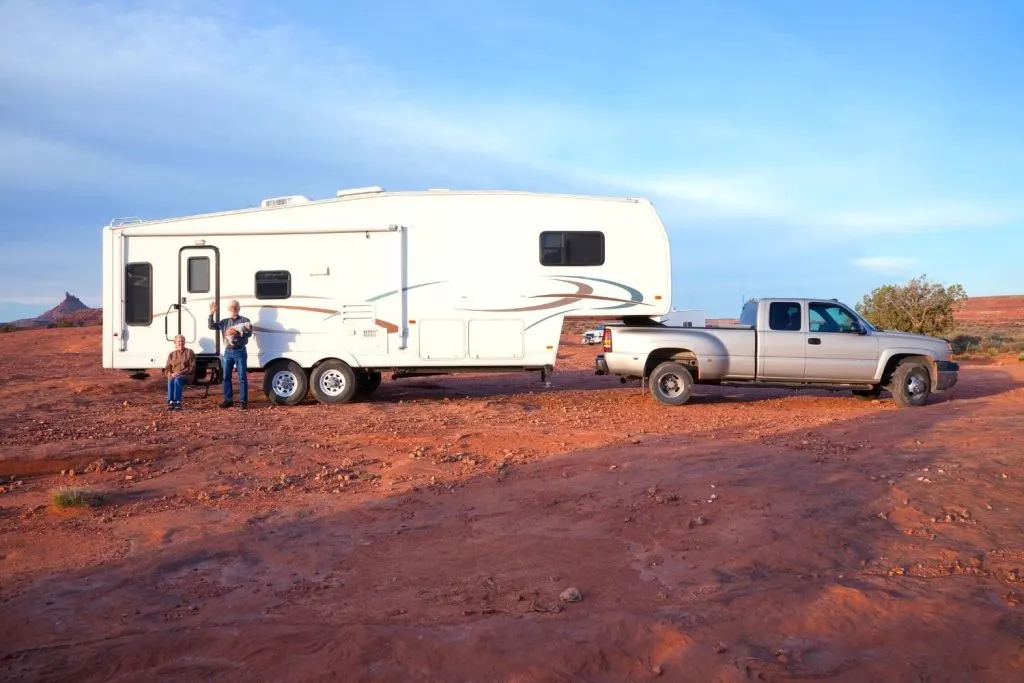
#7 Read Reviews
Reviews will help you find the right off-grid location for you.
Other RVers answer essential questions in reviews, even those you didn’t even know to ask. Find answers to questions like: “Will my RV fit?”, “What are the roads like in the area?”, “How safe is it?”.
If possible, read reviews from different sources. That way, you can get as much information as possible and get a feel for the place before you make solid plans. Use reviews to select a backup location as well.
#8 Find a Boondocking Buddy
If you’re new to boondocking, a good tip is to go with another RVer. It’ll help you feel safe and supported. You can explore the area together, share supplies if needed, etc. Safety in numbers, right?
Some RV social clubs have camping events on public lands and other free camping locations. It’s a great way to experience boondocking without worry. If you go this route, know that you don’t usually party with other boondockers or park close to them.
Speaking of parking…
#9 Don’t Park Too Close to Others
One of the main reasons people choose to boondock is to camp away from others; they don’t want a neighbor. They want privacy and open spaces. If they were interested in neighbors, they would choose a more traditional camping location.
So when you arrive, don’t park right next to an RV. Try to keep your distance. There is no rule to tell you how far you should be, but the farther away from others, the better.
Keep in mind: These are the 7 deadly sins of boondocking.
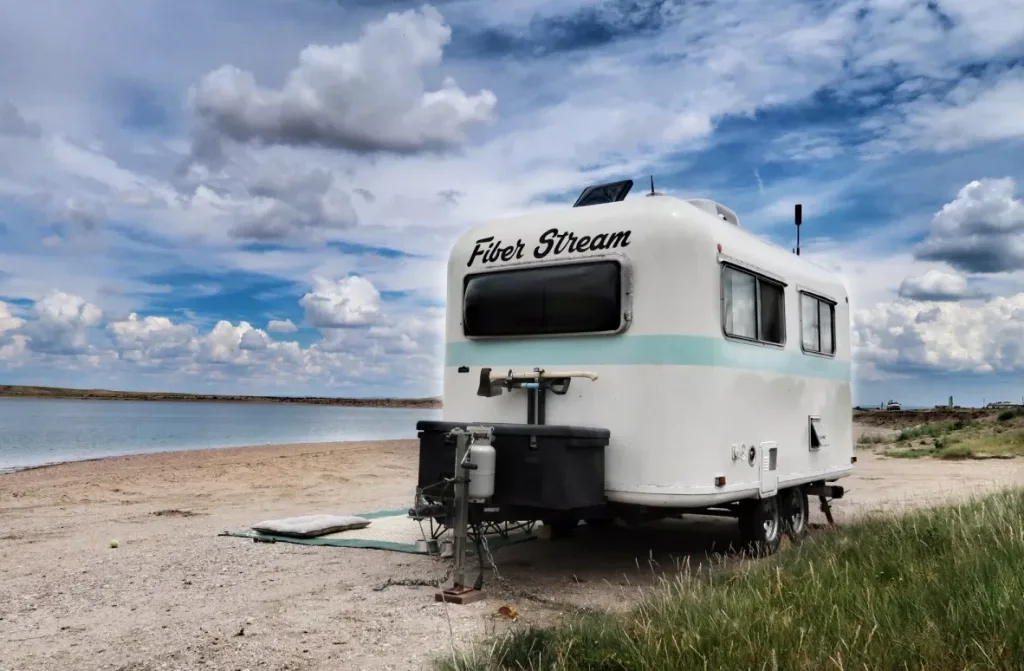
#10 Know Your Needs
If you plan to off-grid on a mountain for two weeks, but you know you run through your clean clothes in one week, what will you do? Will you handwash them or head to the nearest laundromat? You need to have a plan before you go.
What about food? Do you have a restrictive diet? How much of that food can you store and maintain while you’re boondocking? These are things you need to consider.
Also, are you working or homeschooling while wild camping? You might need to have cell service to get it all done. And sometimes, just because you have some signal doesn’t mean it works the way you’re accustomed.
#11 Make Sure You Have Cell Service
We mentioned cell service above, but it’s essential to have the ability to make phone calls in case of an emergency. If your RV breaks down, gets stolen, catches on fire, or you have a medical issue, you need to be able to get help.
To find out about cell reception, search online reviews. These reviews usually include the carrier and number of bars for the location. Campendium is an excellent resource for finding boondocking locations because users provide helpful tips along with cell service quality.
If you want a backup, we recommend getting a satellite messenger. You can get one that transmits a one-way message (you can send out messages only) or two-way communication.
In addition, ensure you have an excellent first aid or trauma kit to handle anything from bandaging a small cut to splinting a broken bone. Even if you can call 911, they might take a while to get to you.
Pro Tip: You can make your own basic first aid kit.
#12 Bring Plenty of Propane
Having enough propane is a good tip for all camping, especially when boondocking. There’s no propane refill station in the middle of the desert.
Trust us when we say you don’t want to wake up in the middle of an unseasonably cold night to discover you’re out of propane. Once it’s gone, you can’t use your stove, and your fridge and furnace will turn off. So, definitely confirm you have extra and full propane tanks.
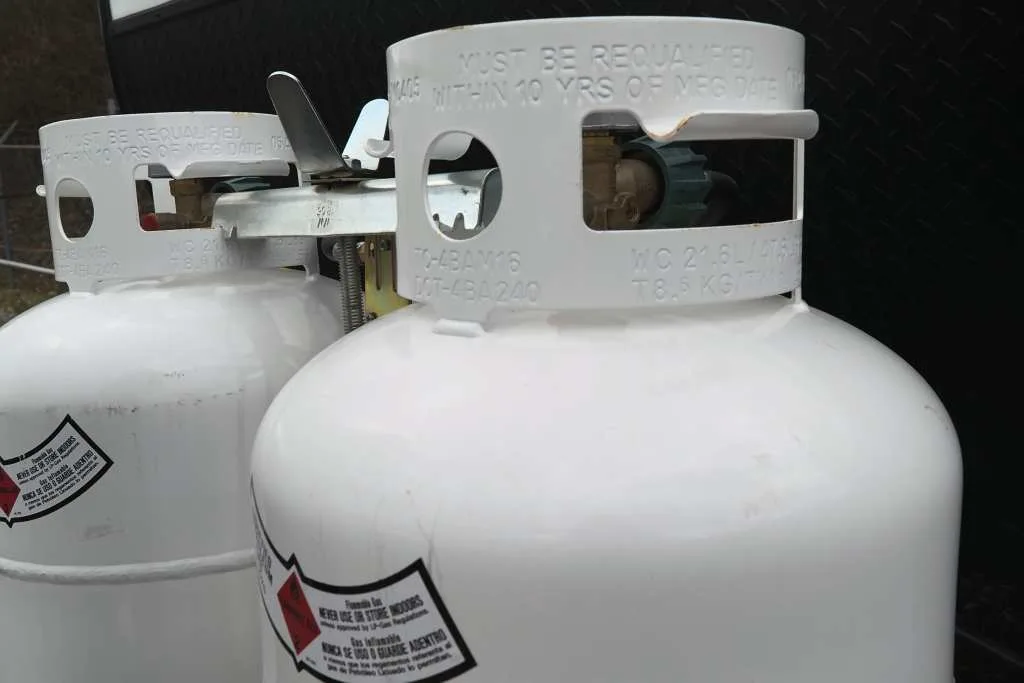
#13 Prep Food
We already touched on your food needs, but let’s get into more detail.
You’ll be camping somewhere secluded and far from grocery stores and restaurants, so you need a food plan. Make sure you have enough food that’s easy to prepare and cook. Remember, you won’t have unlimited power or water.
Before your trip, pre-wash your fruits and vegetables and store them in sealed containers. Cook and freeze meals ahead of time to minimize water and propane use during your trip. If you have easy one-pot meal recipes, now’s the time to dust them off and use them.
#14 Scout Ahead
Once you’ve selected your boondocking location, our tip is to check it out before you drive your RV somewhere you’ve never been. That especially goes for those of you with longer and heavier rigs.
Although many reviews will talk about roads and campsites, the area may have changed since the last reviews. You won’t know the condition of the site until you see it yourself.
Before setting up camp, drive your toad, walk, or bike to your campsite to ensure your RV can make it. Scouting also helps you select the best site for your rig.
Arrive early in the day to give yourself time to find another place in case your first pick is unsuitable.
#15 Stay on the Path
Although boondocking sites are out in the wilderness, they’re still along established roads. Land management often creates designated campsites and wants you to stay only in those spots. In other words, don’t make new campsites when some already exist.
Also, if you plan to hike, follow designated trails. Staying on the path keeps the area safe and usable for future campers and wildlife.
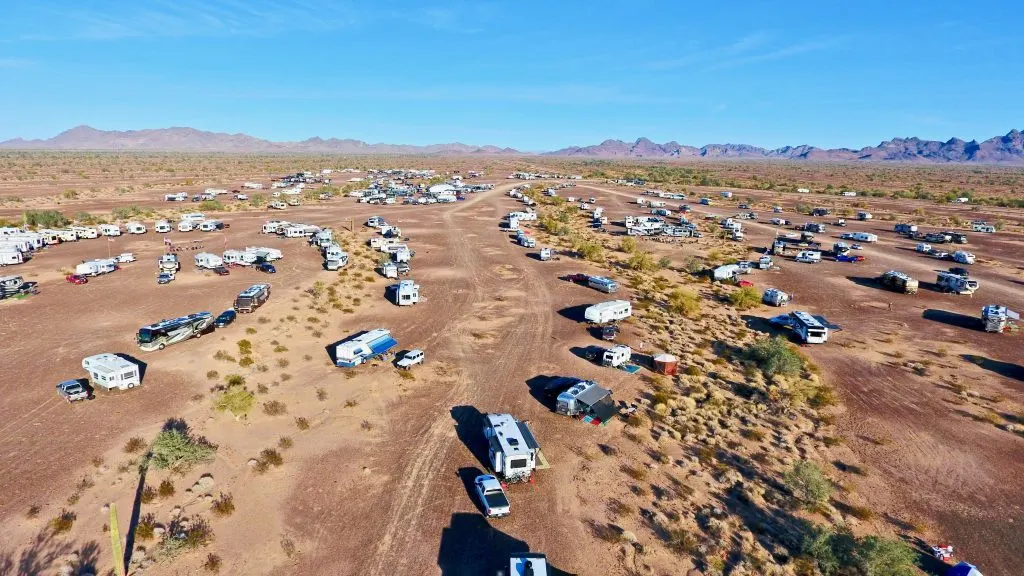
#16 Use a Portable Shower
If you don’t have a shower in your RV, you might want to invest in a portable one because there’s no bathhouse when you boondock.
Taking a shower in your RV is one of the fastest ways to use your freshwater reserves and fill your gray tank. Shorten showers and only use enough water to lather and rinse. Use dry shampoo instead of washing your hair in the shower.
To conserve even more water, collect that shower water and use that to flush your toilet.
If you have an outdoor or portable shower, you don’t have to worry about filling up your gray tank. Remember, though, it still uses up your water reserves.
#17 Bring Your Own Toilet
Most RVs have toilets, but some smaller units don’t. Out in the boonies, there usually aren’t any facilities. If you’re lucky, there might be a vault toilet. But you typically need to bring your own.
There are plenty of options for portable toilets. You can have a basic 5-gallon bucket with a toilet seat and lid or one that flushes like a regular toilet. The 5-gallon bucket version does not use any water, but you have to line it with a plastic bag and add absorption medium. The flushing toilet uses water and chemicals.
You also might want to look into the many composting or incinerator toilet options if you’ll be boondocking regularly.
#18 Empty Your Tanks Appropriately
You must dump your gray and black tanks in a proper location. When you’re boondocking, there is no sewer or dump station. That means you need to either empty them into a portable tank or keep those tanks closed and dump them when you get to a dump station.
Don’t dump your tanks on the ground. The black tank is raw sewage and must be handled properly. Although your gray water only contains food, oils, and soaps, it can be harmful to the environment.
Legal Question: Is it legal to dump RV grey water on the ground.
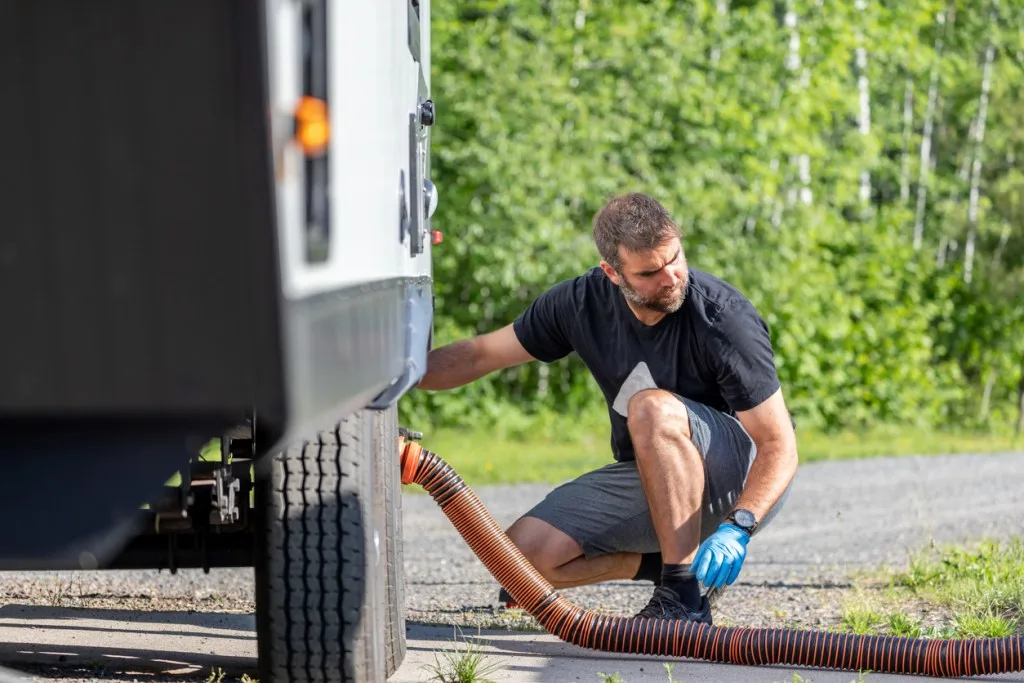
#19 Be Aware of Wildlife
While camping, you don’t want to attract wildlife, especially when wild camping.
Properly store all of your food and food waste. You shouldn’t keep it outside unless the site provides special food lockers and locked waste bins.
Be aware of the wildlife in your area and how to defend and protect yourself from them. Bear spray is an excellent defense to have at all times. It works on other wild animals besides bears.
Never approach wildlife and keep a safe distance from them. Most places require you to maintain at least 300 feet from predators such as wolves and bears and 75 feet from other animals.
#20 Don’t Be Noisy
Boondockers are looking for seclusion and time in nature. They don’t want to hear your conversation (or argument), music, or TV. If loud RVers are annoying in an RV park, they’re even more so when wild camping.
Only run a generator when necessary and respect quiet hours. Typical quiet hours run from 10 pm to 8 am. Those quiet hours also apply to other noises and activities.
#21 Heed Stay Limits
Boondocking locations have stay limits. Some places change the maximum length of camping for different seasons. Make sure you check before you show up to camp.
Off-grid campsites in state and county properties typically have seven-day maximum stays. BLM land allows boondockers to stay for 14 consecutive days in one place. Some even offer long-term stays for a small fee. These are often three or six-month permits.

#22 Trust Your Gut
We can share our best boondocking tips, but none of that matters if your campsite doesn’t feel right. It can be the perfect spot on paper, but if you feel uncomfortable, leave. Always have a backup plan in case this happens. You don’t want to end up in a dangerous situation because you ignored your gut reaction.
#23 Don’t Set Up Camp in a Wash
This is regarding anywhere that doesn’t get much rain fall. A wash will be the first area to see the collected rain turn into a stream, and then a river.
Some boondocking sites are even called “wash” (for example Craggy Wash in Lake Havasu, Arizona).
By simply surveying the land, you can generally see where water will flow first in a downpour. Stay away from those areas.
Our Final Tip? Use Common Sense
There are our 22 boondocking tips for this year. The shared theme is being smart and using common sense. Know your limits, plan ahead, be prepared, and take care of the land you’re on.
What do you think? Did we miss anything?
Discover the Best Free Camping Across the USA
To be honest with you, we hate paying for camping. There are so many free campsites in America (with complete privacy).
You should give it a try!
As a matter of fact, these free campsites are yours. Every time you pay federal taxes, you’re contributing to these lands.
Become a FREE CAMPING INSIDER and join the 100,000 campers who love to score the best site!
We’ll send you the 50 Best Free Campsites in the USA (one per state). Access the list by submitting your email below:
A good first aid kit or trauma kit is so important if you’re boondocking in the boonies! Even if you don’t know how to use some of the items, there may be someone around you who does.
Great info! Thanks so much!
Finally found a comment area. Good tips. I have been boondoggling on Saturday nights at the city provided kayak launch area to get an early start kayak fishing on the grass flats/mangrove trees.
I like ur tips, common sense will tell u what to do for most peoples.
Which manufacturer compost toilet do you Recommend